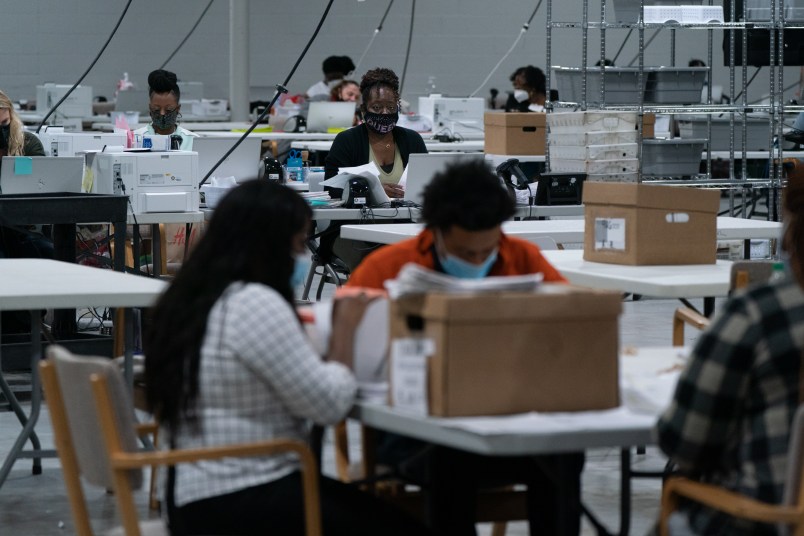As Georgia’s hand-count audit of its presidential contest gets underway, the state Republican Party is already making misleading complaints about how the state is handling the process — a sign of how committed the GOP is to sowing doubt about Joe Biden’s win, regardless of the thoroughness of the verification measures to confirm his victory.
A letter the state GOP sent to Secretary State Brad Raffensperger Thursday night, as reported by Georgia Public Radio, mischaracterized the audit process and why it was being conducted.
It appears to be a part of the larger ploy by President Trump and his allies to stave off formal declarations of his defeat, which was projected nearly a week ago. Biden’s margin has only gotten larger in some key states in the days since.
“This letter intentionally makes requests designed to prolong the recount and delay the opportunity to give Georgia voters assurance their votes were counted properly,” Raffensperger’s press secretary Ari Schaffer, who previously worked in the Trump White House, said in a statement to TPM. “It also asks for cumbersome, time-consuming steps, that are not part of any audit or recount procedures in Georgia law or State Election Board rules. This recount is being guided by trusted, nonpartisan national experts following best practices used across the country, and every step is within view of monitors from both parties, the media and the public.”
One of the complaints the Republicans made Thursday is that Georgia’s audit will not involve re-checking the voter signatures on ballot envelopes to verify their identity.
This complaint fundamentally misunderstands the purpose of the audit. The process Georgia is conducting — known as a “risk-limiting audit”— is meant to serve as a back-check to confirm that the state’s computer tabulation reflects who should have won a race.
It involves going through the ballots themselves, batch by batch, and sorting them by the presidential candidate chosen by the voter. Those piles are then tallied and recorded.
Put simply: going back through envelopes that delivered the ballots is not part of the process.
A major reason that election officials are conducting a hand-count of this sort is that Georgia law already has a requirement that at least one of its statewide races be subject to a risk-limiting audit. In theory, the state could have chosen another statewide race — such as its jungle primary for the U.S. Senate — to run through the procedure.
But at a press conference this week, state officials said that it made sense to conduct the audit on the presidential race, given the false rumors (many of them inflamed by President Trump himself) swirling around about the election technology Georgia uses.
“There are people out there that just fundamentally will not believe the outcome,” Gabe Sterling, the chief operating officer of Raffensperger’s office, said a press conference Thursday. “They say, ‘I don’t trust these computers, so I need a human being to have looked a that to make sure it is right.’”
(A broad swath of the election administration community, joined by the cybersecurity arm of Trump’s own Department of Homeland Security, has already knocked down the false claims about election technology supposedly changing votes.)
In risk-limiting audits that are done on races that are not particularly tight, only a sample of ballots would be hand-counted, because the goal is just to establish a statistical level of confidence that the computer tabulation produced the correct winner. But because the margin between Biden and Trump is so close, the sample size required to establish that confidence is large enough that it will actually be less administrative work to hand count all the ballots instead.
That means that, in order for the state to make its certification deadline, counties have only six days to sort and count by hand 5 million ballots.
“This will be the largest hand re-tallying by an audit in the history of the United States,” Sterling said Thursday.
Due to inevitability of human error, it’s likely that the audit numbers will be “slightly” different than the initial tally of the ballots, Sterling said.
The GOP letter makes several complaints about the supposed lack of transparency into the counts. The count is open to the public, however, with a viewing area for both the media and other observers. Some counties are even livestreaming their audits.
Furthermore, according to guidance sent by the state, at least two monitors (one from each party) will be allowed to leave the viewing area to more closely watch the count at each county office. The Republicans wanted a monitor for each team of counters separating and tallying the batches.
One Democrat, one Republican walk the aisle as @ClaytonCountyGA elections employees recount Presidential ballots, Nov. 13, 2020: pic.twitter.com/oo2kaeTF05
— @RKempNews (@RKempNewsDaily) November 13, 2020
The Republicans are also complaining about the timeline, and sought to delay the audit’s start until Monday.
But already, it was going to be a herculean task for county audit operations to finish by the Wednesday 11:59 p.m. deadline the state has set. The deadline was chosen so that Georgia could meet its Nov. 20 state certification deadline.
“No matter what, it’s gonna be a lot of work: a lot of people working a lot of long hours,” Ben Adida, the executive director of VotingWorks, which is advising the state on the audit, told TPM
The irony of all this work is that when it’s done, Trump could still ask for an actual “recount,” as envisioned by the state code, which allows for such petitions in races where the margin is .5 percent or less. That recount would require election officials to re-scan the QR codes from the ballots through the tabulators.
State officials are hoping that won’t be necessary.
“I would hope that common sense would prevail,” Sterling said Thursday, as the chances of a computer recount changing a result already confirmed by hand are “slim to none.”
Update: This story has been updated to include a statement from Raffensperger’s office.



